What ingredient keeps cornbread from crumbling? If you’ve ever baked cornbread that fell apart the moment you sliced it, you’re not alone. This common issue often boils down to the ingredients you use and how you prepare them.
There’s nothing more frustrating than baking a beautiful pan of cornbread only to have it fall apart at the first slice. Whether you’re making it as a side dish for dinner or the base of a comforting Cornbread Dressing with Chicken, crumbly cornbread can be a real letdown.
In this guide, we’ll answer the question, What ingredient keeps cornbread from crumbling? The good news? There’s a science to making cornbread that holds together. From choosing the right ingredients to perfecting your technique, small adjustments can make a big difference. In this guide, we’ll explore what causes cornbread to crumble, the key ingredients that prevent it, and tips to ensure your cornbread is always moist, tender, and sturdy. We’ll also discuss regional differences, such as the debate between Southern Cornbread vs. New York Cornbread, and how these styles impact texture and structure.
Ready to master the art of crumb-free cornbread? Let’s get started!
Why Does Cornbread Crumble?
Have you ever wondered, What ingredient keeps cornbread from crumbling? The answer often lies in ingredient balance. Eggs and flour act as binding agents, while fats and liquids provide moisture to stabilize the crumb. Let’s break down the common causes so you can pinpoint what might be going wrong in your recipe.
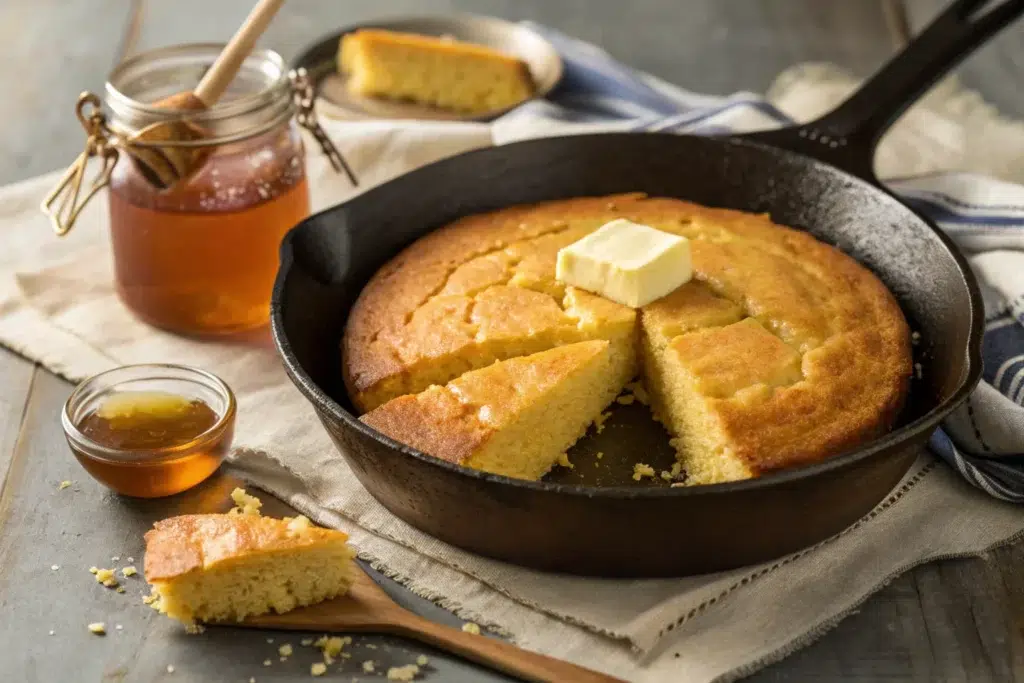
Common Causes of Crumbly Cornbread
- Too Much Cornmeal: Cornmeal is naturally coarse and lacks gluten, which provides structure. Using too much in your batter can result in a dry, crumbly texture.
- Not Enough Binding Agents: Ingredients like eggs and flour are essential for holding cornbread together. Without them, the batter lacks the structure it needs to stay intact.
- Overbaking: Cornbread can dry out quickly if left in the oven too long, making it prone to crumbling.
- Skipping Fat or Moisture: Fats like butter or oil and liquid ingredients like buttermilk play a vital role in keeping cornbread tender and cohesive.
The Role of Ingredients in Texture
Each ingredient in your cornbread recipe has a specific job. For instance, eggs act as a binding agent, while flour adds gluten to stabilize the crumb. On the other hand, the type of cornmeal you choose—coarse, medium, or fine—can significantly affect the texture. For more on how cornmeal impacts texture, check out Why Is My Cornbread So Gritty?.
Essential Ingredients for Preventing Crumbling
When asking what ingredient keeps cornbread from crumbling, eggs often top the list. They bind the batter together, ensuring a cohesive structure. Other key ingredients like buttermilk and oil also play a vital role in keeping cornbread moist and less likely to fall apart.
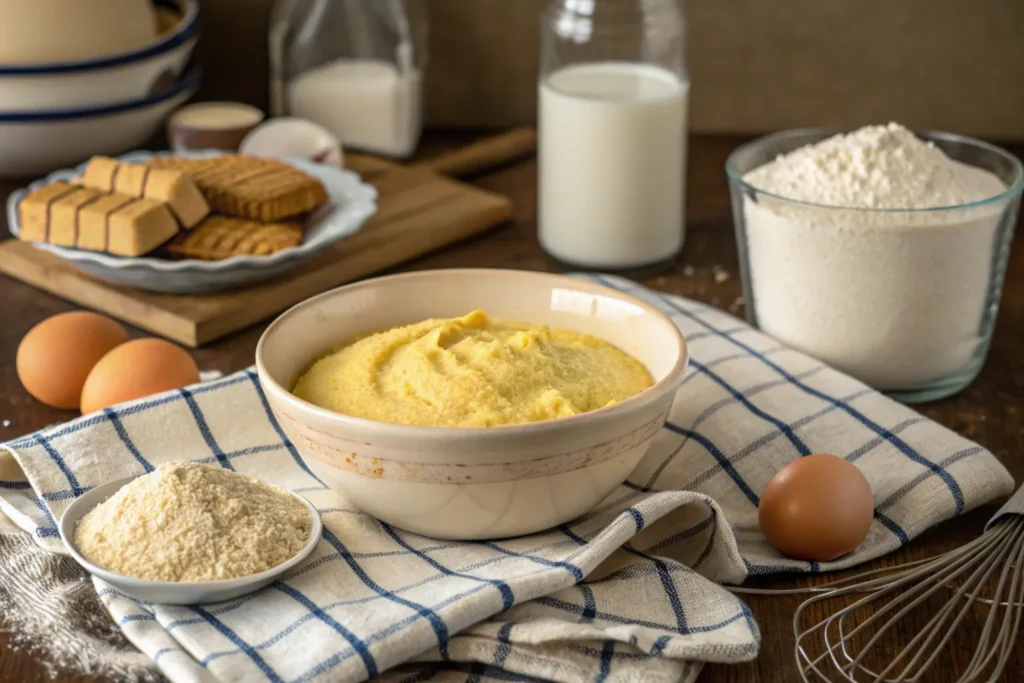
Eggs: The Key Binding Agent
Eggs are one of the most important ingredients in cornbread. They act as a glue, binding the cornmeal, flour, and other components together. If you’re making a recipe without eggs, such as this Chicken Dressing Casserole Recipe, you’ll need to substitute another binding agent like flaxseed meal or unsweetened applesauce.
Adding Fat for Moisture and Structure
Fats like butter, oil, or even beef tallow contribute to the moisture and cohesiveness of cornbread. Traditional Southern recipes often rely on ingredients like beef tallow to add richness and prevent the bread from drying out.
Flour: Balancing the Cornmeal
Flour brings gluten to the mix, which helps stabilize the crumb and prevents excessive crumbling. A 2:1 ratio of cornmeal to flour is a good starting point for most recipes, but you can adjust it based on your preference for texture.
Dairy Products: Buttermilk, Yogurt, and More
Buttermilk and yogurt not only add flavor but also help tenderize the cornmeal. Their acidity reacts with leavening agents like baking soda, creating a lighter, less crumbly bread. If you’ve ever wondered why Southerners avoid sugar in cornbread, it’s often to let the dairy and cornmeal shine in a more savory profile.
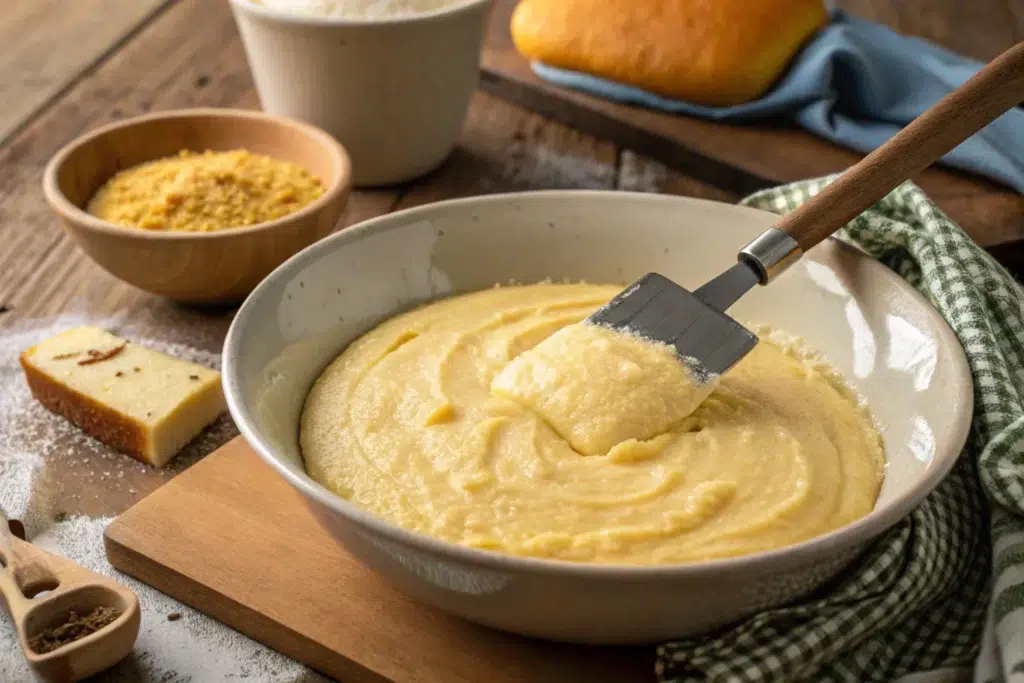
How to Choose the Right Ingredient Combinations
Finding out what ingredient keeps cornbread from crumbling is about more than just one component—it’s about balance of ingredients to achieve a sturdy yet tender texture. Let’s explore how to fine-tune your recipe for crumb-free results.
Adjusting Ratios for Perfect Cornbread
The ratio of cornmeal to flour, eggs, and liquid plays a critical role in the texture of your cornbread. A 2:1 ratio of cornmeal to flour provides structure while keeping the crumb soft. If you prefer a lighter texture, increase the amount of flour slightly, but avoid overdoing it as it can dilute the corn flavor.
Substitutes for Special Diets
For those with dietary restrictions, substitutions can be key to a crumble-free cornbread:
- Replace eggs with flaxseed meal or chia seeds mixed with water for a vegan-friendly option.
- Use almond flour or gluten-free baking flour to maintain structure in gluten-free recipes.
- Swap buttermilk with a mixture of plant-based milk and apple cider vinegar to mimic the tangy flavor and moisture it provides.
For examples of diet-friendly recipes, check out this Chicken Dressing Casserole Recipe, which incorporates adaptable methods to suit different needs.
Incorporating Regional Styles
Regional variations in cornbread recipes often depend on ingredient combinations. For instance, Southern Cornbread typically uses less sugar and more fat, resulting in a moist, sturdy texture that pairs well with savory dishes.
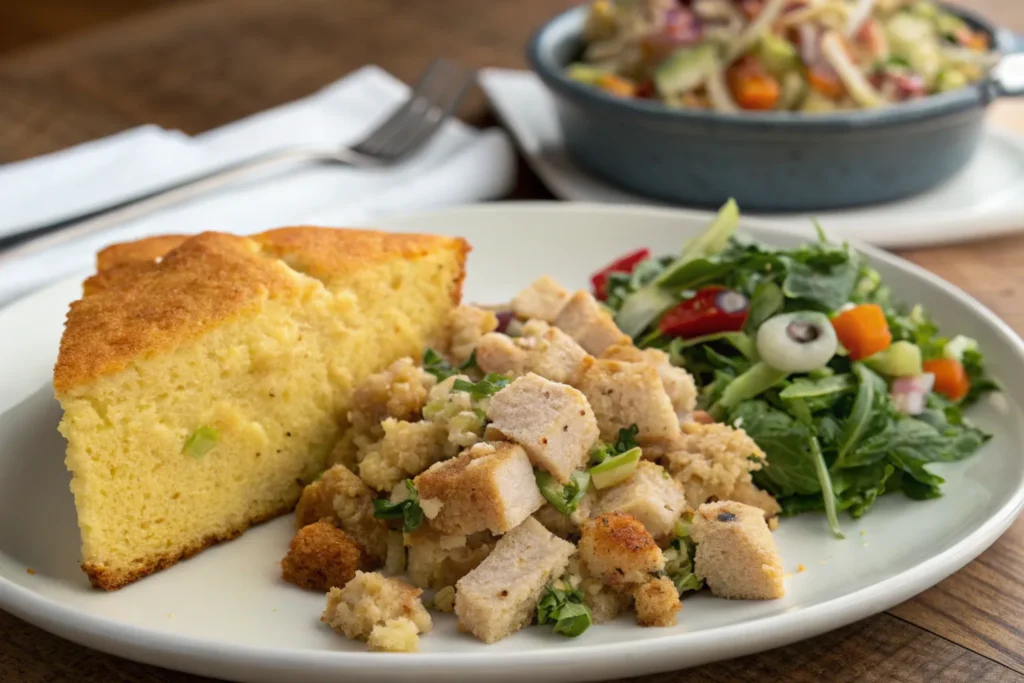
Tips for Making Cornbread That Holds Together
Even with the perfect ingredients, your technique can make or break the texture of your cornbread. Follow these tips to ensure your cornbread comes out tender, moist, and stays intact.
Proper Mixing Techniques
When combining your ingredients, mix just until everything is incorporated. Overmixing activates the gluten in the flour, making the cornbread dense and prone to cracking. On the flip side, undermixing can leave pockets of dry cornmeal, leading to uneven texture.
Baking Temperatures and Times
Cornbread needs consistent heat to cook evenly and develop structure. Preheat your oven to 375°F–400°F, and bake the cornbread in the center rack to avoid overcooking the edges. Keep a close eye on baking time—overbaking dries out the bread, causing it to crumble.
Resting the Batter Before Baking
Letting the batter rest for 10–15 minutes before baking allows the cornmeal to absorb the liquid, softening the grains and creating a more cohesive crumb. This step is especially helpful when working with coarser cornmeal.
Practical Additions for Stability
Incorporating cheese, creamed corn, or a dollop of sour cream into your batter can add extra moisture and binding power. These ingredients not only enhance flavor but also help prevent your cornbread from falling apart.
For more guidance on troubleshooting texture issues, check out Why Is My Cornbread So Gritty?.
Common Variations and Recipes for Crumble-Free Cornbread
Cornbread comes in many variations, each with unique ingredients and techniques to enhance texture and flavor. Here are some of the most popular styles and tips for making them crumble-free.
Traditional Southern Cornbread
Southern cornbread is known for its savory flavor and sturdy texture. Recipes like this Southern Cornbread Recipe with Beef Tallow rely on fat and minimal sugar to keep the crumb moist and cohesive, making it ideal for pairing with savory dishes like chili or stews.
Sweet Cornbread with Honey
For a sweeter variation, incorporate honey or sugar into the batter. The added moisture from honey not only enhances flavor but also helps bind the ingredients together, reducing crumbling.
Gluten-Free Cornbread Tips
Gluten-free cornbread can be tricky, but blending almond flour or gluten-free baking flour with cornmeal provides structure. Using eggs and dairy alternatives like almond milk ensures the bread holds together while staying tender.
Vegan Cornbread Options
Vegan cornbread often uses flaxseed meal or chia seeds as egg replacements and plant-based milk for moisture. Recipes like Cornbread Dressing with Chicken can be adapted to include vegan ingredients, offering a crumble-free result that satisfies dietary needs.
Experimenting with Add-Ins
Adding ingredients like shredded cheese, creamed corn, or diced jalapeños can improve the texture while infusing your cornbread with extra flavor. These additions create a denser crumb that resists crumbling.
FAQs About What Ingredient Keeps Cornbread From Crumbling
To keep cornbread from crumbling, ensure you use enough binding agents like eggs and flour. Adding fat, such as butter or oil, and liquid ingredients like buttermilk can also help maintain moisture and structure. Letting the batter rest before baking allows the cornmeal to absorb liquid, resulting in a more cohesive texture.
The primary binders in cornbread are eggs and flour. Eggs act as a glue that holds the ingredients together, while flour provides gluten, which stabilizes the crumb. In vegan recipes, alternatives like flaxseed meal or chia seeds mixed with water can serve as effective binders.
To enhance a cornbread mix, consider adding creamed corn, shredded cheese, or sour cream for extra moisture and flavor. A touch of honey or sugar can balance the savory notes, while a splash of buttermilk elevates the richness and tenderness.
Dry, crumbly cornbread is often caused by overbaking or an imbalanced recipe with too much cornmeal and not enough fat or liquid. Ensure your ratios are correct and avoid overmixing, which can result in a denser, less cohesive crumb.
Yes, adding an extra egg can improve binding and contribute to a smoother texture. Eggs also add richness and moisture, making your cornbread less likely to crumble. However, avoid adding too many, as this can make the bread overly dense.
To make cornbread less crumbly, focus on ingredient ratios and techniques. Use medium-ground cornmeal for balance, add fat like butter or oil, and include binding agents like eggs and flour. Soaking the cornmeal before mixing and resting the batter before baking are additional steps that help create a cohesive texture.
Conclusion – Mastering the Art of Perfect Cornbread
Now that you know what ingredient keeps cornbread from crumbling, cornbread doesn’t have to crumble at the wrong time! With the right balance of ingredients and techniques, you can create a moist, tender, and cohesive cornbread every time. Key ingredients like eggs, flour, and fats play a vital role in binding the crumb, while proper mixing and resting techniques further enhance the texture.
Whether you’re crafting a classic recipe like Southern Cornbread with Beef Tallow or experimenting with sweet and savory variations, understanding the science behind each ingredient makes all the difference. Remember, the texture of your cornbread reflects the care you put into selecting ingredients and following techniques like soaking and resting the batter.
By incorporating these tips and ideas, your cornbread will no longer fall apart—it will stand out as a side dish, a base for Cornbread Dressing with Chicken, or a star on its own.

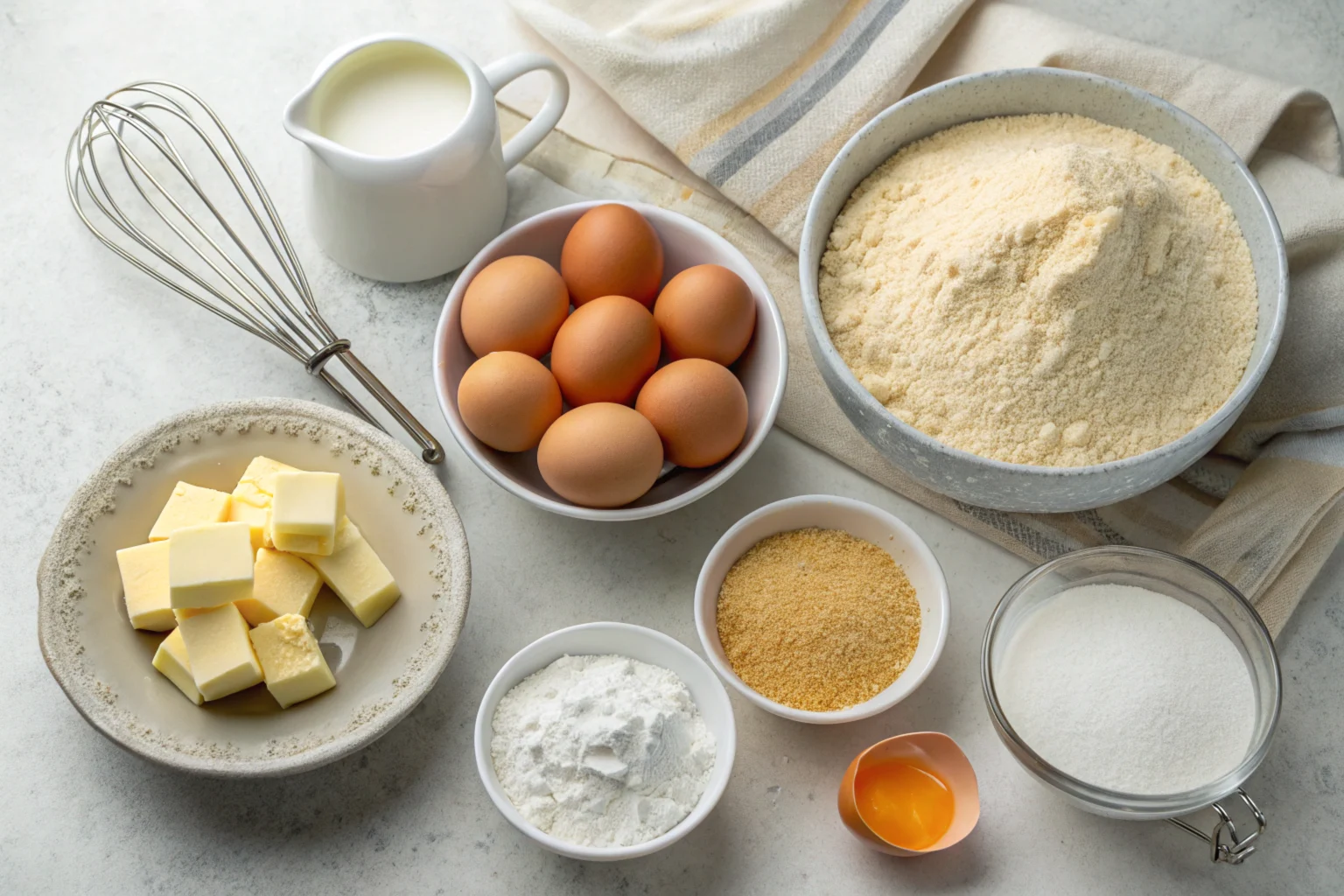
1 thought on “What Ingredient Keeps Cornbread from Crumbling?”
Comments are closed.